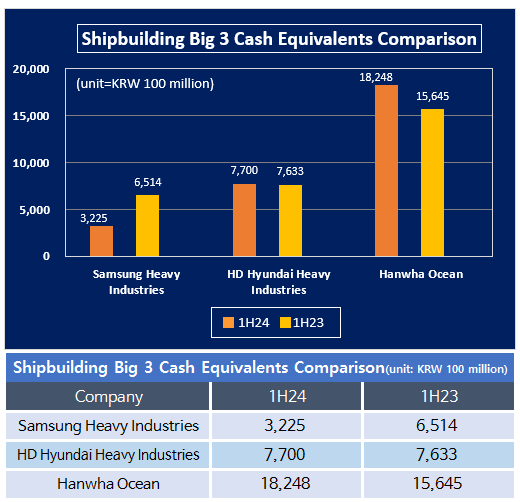Through last month, the company had issued a total of KRW 380 billion in commercial paper (CP). By March, the company had repaid KRW 70 billion of CPs that had matured, leaving a current outstanding balance of KRW 310 billion. All of the CPs issued so far have a maturity of six months or less.
 이미지 확대보기
이미지 확대보기Samsung Heavy Industries's borrowings in the first half of this year totaled KRW 3.62 trillion, up 14.3% year-on-year. During this period, short-term borrowings increased, while long-term borrowings decreased. Short-term borrowings increased by 18.4% to KRW 2.2 trillion over the year, while long-term borrowings decreased by 36.7% to KRW 197.2 billion.
The continued borrowing is linked to the increase in orders. Typically, shipbuilders receive ship contracts in installments depending on the stage of construction, but the initial down payment is not enough to complete the construction of a ship, so they need to raise funds through bank loans or issuance of corporate bonds in the interim. As the number of orders increases, the company has no choice but to continue borrowing externally.
To date, Samsung Heavy Industries has secured orders for 24 ships totaling $5.4 billion (about KRW 7.3 trillion), achieving 56% of its order target of $9.7 billion (about KRW 13.1 trillion) for the year. The backlog to date stands at $31.9 billion(about KRW 43.1 trillion), representing more than three years of work.
The company recently signed a KRW 678.3 billion contract with an Asian shipowner for the construction of two liquefied natural gas (LNG) carriers. The vessels are scheduled to be delivered to the shipowners sequentially through April 2027.
However, in the first half of this year, Samsung Heavy Industries was the only one of the Big Three (Hanwha Ocean, HD Hyundai Heavy Industries, and Samsung Heavy Industries) to see a year-on-year decline in cash assets. It fell by half from KRW 654.1 billion in the first half of last year to KRW 325.5 billion at the end of June this year. This is down 44.23% from KRW 583.8 billion at the end of last year.
“While the working capital burden will persist for the time being due to an expanded order backlog compared to the past, cash inflows from improved profitability and increased delivery volumes will ease the borrowing burden in the future,” said Park Hyun-joon, head researcher at Nice Credit Ratings' Corporate Assessment Department, in a recent report on the shipbuilding industry.
Shin Haeju (hjs0509@fntimes.com)
가장 핫한 경제 소식! 한국금융신문의 ‘추천뉴스’를 받아보세요~
데일리 금융경제뉴스 Copyright ⓒ 한국금융신문 & FNTIMES.com
저작권법에 의거 상업적 목적의 무단 전재, 복사, 배포 금지

















![모델솔루션, 로봇 장착 1년 만에 수익률 207% [정답은TSR]](https://cfnimage.commutil.kr/phpwas/restmb_setimgmake.php?pp=006&w=110&h=79&m=5&simg=202601271518280047274925877361211627527.jpg&nmt=18)

